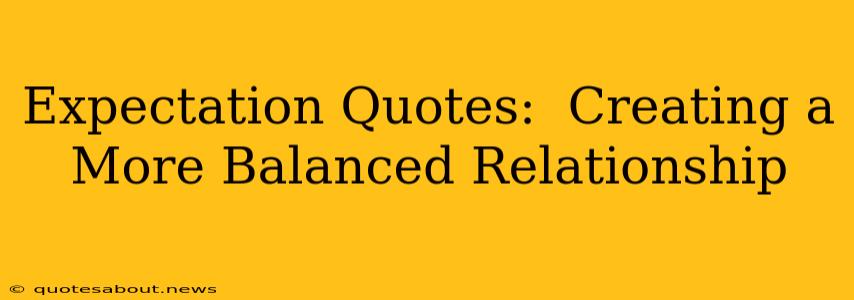Navigating relationships successfully hinges on managing expectations. Unrealistic or unspoken expectations are a breeding ground for conflict and resentment. Understanding and communicating expectations is crucial for building a healthy, balanced partnership. This article delves into the importance of managing expectations in relationships, offering insights and practical strategies to foster a more harmonious connection. We'll explore common relationship expectations, the pitfalls of unmet expectations, and how to communicate effectively to prevent misunderstandings.
What are Realistic Expectations in a Relationship?
Realistic expectations are grounded in the realities of a relationship—its ebbs and flows, individual differences, and the inherent complexities of human connection. They acknowledge that your partner isn't a mind reader and that perfection is unattainable. Realistic expectations focus on mutual respect, open communication, and shared values, rather than demanding a specific outcome or behavior. For instance, expecting unwavering support during challenging times is realistic; expecting your partner to always anticipate your needs without communication is not.
What are Unrealistic Expectations in a Relationship?
Unrealistic expectations stem from idealized visions of relationships often fueled by societal pressures, media portrayals, or personal insecurities. These expectations can be rigid, inflexible, and demanding, setting both partners up for disappointment. Examples of unrealistic expectations include:
- Expecting your partner to fulfill all your emotional needs: While a partner should be a source of support, relying solely on them for emotional fulfillment is unrealistic. Healthy relationships involve a diverse support system.
- Expecting constant affirmation and validation: While appreciation is vital, constantly needing external validation can be draining for both partners. Self-esteem and self-worth should come from within.
- Expecting a perfect, conflict-free relationship: Disagreements are inevitable. A healthy relationship involves navigating conflict constructively, not avoiding it entirely.
- Expecting your partner to change fundamentally: Accepting your partner for who they are is crucial. Trying to mold them into someone they're not is a recipe for disaster.
How Do Unmet Expectations Affect Relationships?
Unmet expectations breed resentment, frustration, and disappointment. When your needs or desires aren't acknowledged or met, it can lead to feelings of being undervalued or unappreciated. This can manifest as:
- Increased conflict: Arguments arise from unmet expectations, fueled by unspoken resentments.
- Emotional distance: Unfulfilled expectations can create a sense of disconnect and emotional withdrawal.
- Loss of trust: Repeated unmet expectations erode trust, creating a foundation of insecurity.
- Relationship breakdown: Persistent unmet expectations can ultimately lead to the deterioration and failure of the relationship.
How Can I Communicate My Expectations Effectively?
Open and honest communication is the cornerstone of managing expectations. This involves:
- Identifying your expectations: Take time to reflect on your needs and desires in the relationship.
- Expressing your expectations clearly and calmly: Use "I" statements to avoid blaming or accusing your partner. Focus on your feelings and needs. For example, instead of saying "You never listen to me," try "I feel unheard when I share my thoughts; could we work on improving our communication?"
- Actively listening to your partner's expectations: Create a space for open dialogue, ensuring both partners feel heard and understood.
- Finding common ground and compromise: Relationships are about collaboration, not control. Negotiate and find solutions that work for both partners.
- Regularly revisiting and adjusting expectations: Relationships evolve, and expectations should adapt accordingly. Regular check-ins can help ensure both partners are on the same page.
What Happens When Expectations Aren't Met?
When expectations aren't met, it's crucial to address the issue directly and constructively. Avoiding the problem will only exacerbate it. Have an open conversation with your partner, expressing your feelings without blame. Focus on finding solutions together rather than assigning fault. Consider seeking couples counseling if you're struggling to navigate these challenges on your own. Remember, healthy communication and mutual understanding are key to resolving unmet expectations.
How Can I Set Healthy Boundaries in My Relationship?
Setting healthy boundaries is crucial for managing expectations. This involves clearly defining your limits and communicating them to your partner. Boundaries protect your emotional and physical well-being while fostering respect and understanding in the relationship. For instance, establishing boundaries around personal time, communication styles, and personal space can prevent resentment and maintain a sense of individuality within the partnership.
How Can I Manage My Expectations to Create a More Balanced Relationship?
Managing expectations involves a continuous process of self-reflection, honest communication, and mutual compromise. By understanding your own needs, actively listening to your partner, and fostering open dialogue, you can create a more balanced and fulfilling relationship. Remember that a healthy relationship is built on mutual respect, understanding, and a willingness to adapt and grow together. Remember that seeking professional help from a relationship counselor can provide valuable guidance and support in navigating complex relationship dynamics.

